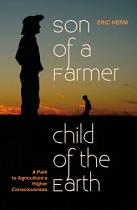GMO foods linked to digestive problems and ecosystem destruction
Eric Herm is a fourth generation farmer on a 6,000 acre cotton farm in West Texas. After graduating from college and working for a spell in television broadcasting, Herm traveled extensively before returning to the farm. Shocked by the changes he saw in the land, he implemented new practices and began to speak out against the ravages caused by commercial agriculture. With a stirring mix of cold hard facts and ardent metaphors, Son of a Farmer, Child of the Earth: a Path to Agriculture’s Higher Consciousness is a call-to-arms both against commercial agriculture’s assault on our natural resources and delicate ecosystems, and for a transformation of farmers from corporate-motivated producers back to the flesh and bone guardian angels of the Earth.
What are your fondest memories of growing up on a farm?
Just the overall freedom of living out in the country. I always had the feeling that I could do whatever I wanted (within reason) by living out in nature. Walking barefoot in fresh plowed fields, riding three-wheelers and lightning/thunderstorms.
What are the harmful effects of GMOs to our health and the health of the planet?
When talking about human health, we’re still very much guinea pigs as far as long-term effects. But many studies already show many negative side effects on our organs, particularly our digestive system. I can’t imagine how many neurological disorders will continue to rise as a direct result from further GMO exposure. Essentially, we’re eating fake food… even poison in the form of food. It’s not real. In livestock, who consume much more GMOs than we do, studies have shown high rates of SDS (sudden death syndrome), high infertility rates, and premature death in foetus and baby animals. In nature, this stuff can react or act as a poison. We have no idea how many different reactions can happen yet. We’re still learning… not comforting facts. There have been direct studies that the use of Roundup Ready GM crops are decimating the monarch butterfly population. Studies also show that when three consecutive generations of mammals consume an all-GMO diet, they can no longer produce another generation. That should scare the hell out of us.
What are the major environmental impacts of industrialized agriculture?
We’re creating dead zones all across the country. Through mono-cropping and the excessive use of GMOs and poisonous chemicals, we’re slowly decimating life on any and every level. Including ourselves.
Are the toxic fertilizers, pesticides and GMO crops used by industrialized farms affecting sustainable farms?
To some degree. With herbicide spraying, there are drift issues due to wind and natural drift. This often causes damages to neighboring fields. Also, companies like Monsanto make no bones about going after organic farmers whose crop has been contaminated by the cross-pollination of their GMO crops from neighboring fields. But organic and non-GMO farmers have begun fighting back by filing their own lawsuits against them for contaminating their crops. We’ve essentially created a war zone in our fields now.
Why are only a small percentage of farms still profitable?
Because food in America is so cheap. It’s awfully hard to make a living growing a particular crop, especially on a small basis, when you can’t get half of parity price. We’re not getting what it’s actually worth. We brag about our cheap food in America, but it is a hindrance to the farmer. It costs everyone in the long run, because what we don’t spend on food, we end up spending on medical and health bills. It’s all related.
How is the government affecting the survival of small, sustainable farms?
Like any other vocation, most legislation is passed to help the billionaires. No farmers are billionaires. Only the food companies are. There is more manipulation and control of our food supply being coerced through insane legislation that is making it more difficult for small-scale farmers to attain their freedom to grow. Thankfully, ideas such as the National Animal Identification Act have failed.
What can people do to get involved and support the small niche of farmers who are still practicing sustainable farming?
We vote with our dollars in this country more than we do at the voting booth for elections. Don’t support GMOs on any level. Know what you are buying, who made it, where it was grown, and what ingredients are in it. Buy organic, buy local, and support local agriculture. We can also harass our congress and grocery stores about labeling GMOs.
Anything else you would like to add?
This isn’t just an agriculture issue for farmers and ranchers. This is an every living creature issue. Everybody eats. Without healthy food and water, we are nothing.
Follow Eric Herm, author of Son of a Farmer, Child of Earth, on Twitter and Facebook.
Internet site reference: http://sproutsavvy.com/food/commercial-agricultures-strain-on-natural-resources-and-the-farmer/
Comments
There are 0 comments on this post













